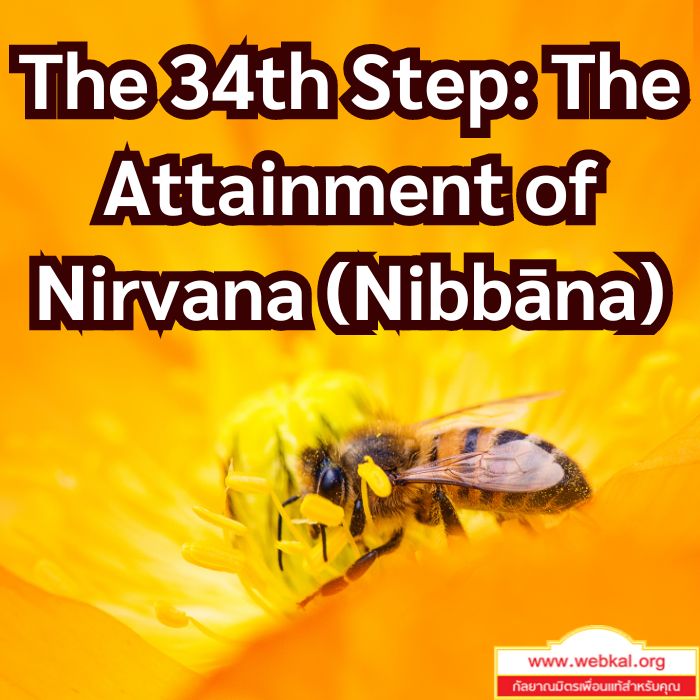
The 34th Step: The Attainment of Nirvana (Nibbāna)
Is there any place in the world where suffering can-not reach? The answer is "No."
Why did Prince Siddhartha become ordained? He was seeking for the place where suffering could not reach.
Did he find it? Yes, he did.
Where was the place? It was Nirvana.
Where is Nirvana? That's a good question, so let's study this subject matter.
Nirvana (Nibbāna) has a variety of meanings. It can be translated as 'extinguishing', like extinguishing evil and suffering; or 'escaping', like escaping from suffering and escaping from the Three Cycles of Existence. There are so many more definitions of Nirvana.
The main two definitions of Nirvana are as follows:
1) Nirvana as a state of mind (sa-upādisesa - nibbāna): Sa-upādisesa – Nirvana is attained by noble ones (monks) who are able to forsake all defilements. This means that they touch upon Nirvana in their experiences when they have purified their minds from all defilements but their Five Aggregates² (Khandha) have not yet broken up. Thus, they are still alive to help all living beings.
2) Nirvana as a realm of existence (anupādisesa - nibbāna): Anupādisesa - Nirvana is attained by the noble ones (monks) who completely extinguish all defilements. It is also the realm outside our body and mind. It is thus sometimes called "posthumous" Nirvana; one can only go there after the breaking up of their Five Aggregates for the last time (one will not be reborn ever again after attaining such state). This place consists of only Dhamma-Aggregates³ or everything that is not rebirth, aging, sickness or death, but true enlightenment and happiness. Only Dhammakāya (the body of enlight - enment) can enter thereon (A manual of peace 388).
Back to the question: Where is Nirvana?
It is in the human body, there is Dhammākaya within.
In Dhammakaya, there is Nirvana or Nibbāna.
see the Noble Truths. Then, once his suffering comes to an end, he attains a true (permanent) happiness, the path the Lord Buddha entered.
The Noble Truths (Ariyasacca) can be variously termed as follows:
1) The great noble truths.
2) The truths of one who is noble.
3) The truths that make one noble.
Seeing these truths means discovering the key to the truths that can liberate a person from suffering, namely:
1) The Noble Truth of Suffering (dukkha-ariyasacca).
2) The Noble Truth of the Origin of Suffering (samudaya-ariyasacca).
3) The Noble Truth to the Cessation of Suffering (nirodha-ariyasacca).
4) The Noble Truth of the Path leading to the Cessation of Suffering (magga-ariyasacca).
Therefore, the Four Noble Truths are the keys or main principles of Buddhism. They act like a blueprint for all other subsequent knowledge.
2.6) Exposure to hateful things (apiyehi sampayoga): The sort that clouds the mind, like grief and averseness.
2.7) Separation from all that is loved and dear (piyehi vipayoga): The heartbreak of separating from such sources of pleasure like our loss of loved one, possessions, fame, etc.
2.8) Disappointment (alabha): It could be physical or spiritual disappointment.
The Lord Buddha knew how to extinguish all kinds of suffering. Hence, He taught, cultivated, and urged people to follow each step of the "Blessings of Life" in order to subsequently eradicate them.
The outcome of a person who is earnest in practicing austerity is that he has the ability to control his senses. He is able to train himself in moral conduct such as conducting celibacy (abstaining from sensuality), entering monkhood, diligently practicing meditation throughout the whole of his life, and following the Eightfold Path.' With his effort, he will be finally able to